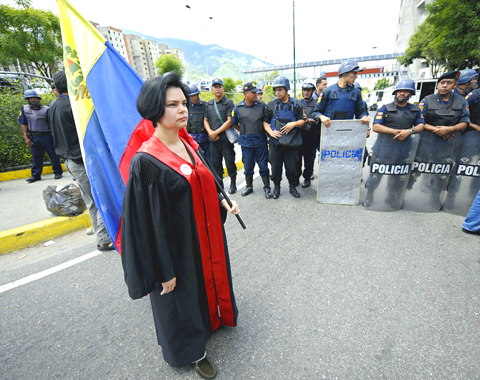Venezuelans may be forced to spy on their neighbors or risk prison terms under Venezuelan President Hugo Chavez’s new intelligence decree, raising fears of a Cuba-style system that could be used to stifle dissent.
Chavez says the intelligence law that he quietly decreed last week will help Venezuela detect and neutralize national security threats, including assassination or coup plots. But many Venezuelans are alarmed they could be forced to act as informants for the authorities — or face up to four years in prison.
“It’s a system just like Cuba,” said Raul Barbiera, an 80-year-old barber who was born in Spain and emigrated decades ago.

PHOTO: AFP
He said the law reminds him of his experiences as a young man during the fascist dictatorship of Spanish General Francisco Franco, when “you couldn’t speak against the government.”
Barbiera said people will watch what they say because “anyone can start a file on you.”
Chavez’s leftist government maintains links to community activist groups and also has set up neighborhood-level “communal councils” that decide how to spend government funds for community projects.
The law says community-based organizations may be called upon to provide intelligence. Critics suspect such groups could become like Cuba’s Committees for the Defense of the Revolution, which often are a forum for neighbors to snoop on each other and report suspicious activities to authorities.
Nancy Silva, a 45-year-old shopkeeper, said she worries about the creation of neighborhood-level spying networks.
“The government wants citizens to spy on each other. That’s scary,” Silva said.
Venezuelan Justice Minister Rodriguez Chacin denied that Venezuela was copying Cuba’s intelligence services.
He said on Monday that all Venezuelans have an obligation to cooperate.
But constitutional law attorney Alberto Arteaga Sanchez noted that Chavez “is constantly calling opposition leaders coup-plotters and pro-imperialists.”
“And that makes me suspect this law may be used as a weapon to silence and intimidate the opposition,” Sanchez said.
Many Venezuelans distrust the intelligence agencies, whose members have been accused over the years of crimes ranging from executions to obstruction of justice.
Chavez has denied the law would infringe on freedoms, saying it falls into “a framework of great respect for human rights” and is necessary to thwart efforts by US spies to gather information on his government.
He says the law would help prevent military rebellions like the 2002 coup that briefly removed him from power.
Rights groups say the law’s surveillance provisions also are a cause for concern.
Security forces do not need court orders for wiretapping and authorities can withhold evidence from defense lawyers if that is deemed to be in the interest of national security.
Venezuela’s new law also revamps the intelligence services, replacing the Disip secret police and Military Intelligence Directorate with four new agencies, two under the Justice Ministry and two under military command.
“Getting the armed forces involved in domestic security tasks are typical of the dark times of military dictatorships,” said Rocio San Miguel, who heads a Venezuelan nongovernmental group that monitors security and defense issues.

Kehinde Sanni spends his days smoothing out dents and repainting scratched bumpers in a modest autobody shop in Lagos. He has never left Nigeria, yet he speaks glowingly of Burkina Faso military leader Ibrahim Traore. “Nigeria needs someone like Ibrahim Traore of Burkina Faso. He is doing well for his country,” Sanni said. His admiration is shaped by a steady stream of viral videos, memes and social media posts — many misleading or outright false — portraying Traore as a fearless reformer who defied Western powers and reclaimed his country’s dignity. The Burkinabe strongman swept into power following a coup in September 2022

‘FRAGMENTING’: British politics have for a long time been dominated by the Labor Party and the Tories, but polls suggest that Reform now poses a significant challenge Hard-right upstarts Reform UK snatched a parliamentary seat from British Prime Minister Keir Starmer’s Labor Party yesterday in local elections that dealt a blow to the UK’s two establishment parties. Reform, led by anti-immigrant firebrand Nigel Farage, won the by-election in Runcorn and Helsby in northwest England by just six votes, as it picked up gains in other localities, including one mayoralty. The group’s strong showing continues momentum it built up at last year’s general election and appears to confirm a trend that the UK is entering an era of multi-party politics. “For the movement, for the party it’s a very, very big

ENTERTAINMENT: Rio officials have a history of organizing massive concerts on Copacabana Beach, with Madonna’s show drawing about 1.6 million fans last year Lady Gaga on Saturday night gave a free concert in front of 2 million fans who poured onto Copacabana Beach in Rio de Janeiro for the biggest show of her career. “Tonight, we’re making history... Thank you for making history with me,” Lady Gaga told a screaming crowd. The Mother Monster, as she is known, started the show at about 10:10pm local time with her 2011 song Bloody Mary. Cries of joy rose from the tightly packed fans who sang and danced shoulder-to-shoulder on the vast stretch of sand. Concert organizers said 2.1 million people attended the show. Lady Gaga

SUPPORT: The Australian prime minister promised to back Kyiv against Russia’s invasion, saying: ‘That’s my government’s position. It was yesterday. It still is’ Left-leaning Australian Prime Minister Anthony Albanese yesterday basked in his landslide election win, promising a “disciplined, orderly” government to confront cost-of-living pain and tariff turmoil. People clapped as the 62-year-old and his fiancee, Jodie Haydon, who visited his old inner Sydney haunt, Cafe Italia, surrounded by a crowd of jostling photographers and journalists. Albanese’s Labor Party is on course to win at least 83 seats in the 150-member parliament, partial results showed. Opposition leader Peter Dutton’s conservative Liberal-National coalition had just 38 seats, and other parties 12. Another 17 seats were still in doubt. “We will be a disciplined, orderly